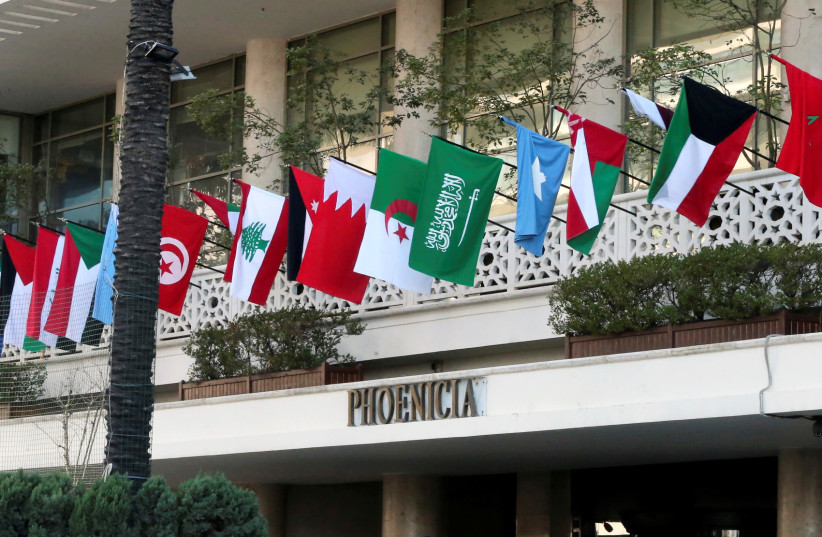While there is no consensus in the Arab League when it comes to re-admitting Syria into the political organization, Iranian media appears to be focused on this issue.
Iran’s Tasnim news published an article based on a piece in The New Arab that analyzed the current issues involved. This comes as The National, a UAE newspaper, reported that “Arab League Secretary-General Ahmed Aboul Gheit said on Wednesday that the Syrian regime was unlikely to be present at the next Arab summit, with consensus lacking to readmit the country into the organisation. But Mr Aboul Gheit said member states would discuss letting the regime of Bashar Al Assad back in next month.”
However, Tasnim says that in fact, the return of Syria could happen due to the policy changes of some Gulf countries.
Could this happen before the upcoming summit?
The Iranian media seems to think so.

“Sources in the Arab League in Cairo said that the UAE has started moves to launch the case,” they reported.
Iran has been reaching out to the Emirates at the same time as their proxies have been attacking Abu Dhabi using drones and missiles in recent weeks. The issue of Syria could play into this because the UAE has done outreach to the Syrian regime.
The Arab League would need consensus among its members to allow the return of Syria, a key ally of Iran, which has sent forces to its regime that traffics weapons to Lebanon and threatens Israel.
What does Tasnim News say?
“The sources further referred to the UAE's consultations with the United States on the issue of Syria's return to the Arab League, a situation in which Washington opposes the move,” the Iranian report notes.
"The sources also referred to the UAE's goals in this regard," it said. "Abu Dhabi believes that by returning Damascus to the Arab League, it will find a window to influence the relations between Damascus and Tehran, and on the other hand, will be able to establish relations with Iran.” Therefore the return of Syria could help UAE-Iran ties?
Meanwhile, there is a disagreement between Egypt and Saudi Arabia regarding the return of Syria to the league.
"The source also reported on the differences between Algeria and Saudi Arabia in this regard, and considered this case as the cause of a stalemate in cooperation between Saudi Arabia and Algeria, especially since Algeria insists on the return of Syria,” the article says. Egypt and the UAE appear to agree that Syria should return to the league.
Then there is the issue of Qatar. Doha works closely with Iran but also has close support for the US as the White House moves to have it receive “major non-NATO ally” status.
Qatar apparently opposes Syria’s return to the League. Thus Damascus is able to be friends with Tehran and not be attacked by Iranian proxies but can oppose Iran’s Syria ally. Qatar is also a close ally of Turkey, which likely opposes the Syrian regime return as well.
“According to the source, Cairo has high hopes for Kuwait's role in this regard, especially given Kuwait's position in the Gulf Cooperation Council and the adjustment of Saudi and Qatari views,” the report says.
This means Kuwait could also be a key to Syria’s return. Kuwait has attempted to remain neutral in Gulf issues and does not want tensions with Iran. Unlike Bahrain and the UAE, it has been cold towards the Abraham Accords so far, which is important to note because Israel’s president was recently in the Emirates and Israel’s defense minister was in Bahrain just days later.
MEANWHILE, Syria’s Foreign Minister Faisal al-Mekdad was quoted as saying that Damascus is not interested in returning to the league. “He strongly criticized the performance of the Arab League and the fact that the union has not achieved any of its goals,” the report said. Mekdad wants Arab countries to re-open embassies in Damascus. Many Arab countries reduced their relations with Syria during the Syrian Civil War.
Iran’s media notes that these Arab countries “started a crisis whose main goal was to hit the resistance front. During this crisis, there was full support for the Syrian opposition, but these efforts did not go anywhere, and little by little, some Arab countries, desperate for the overthrow of the Syrian regime, sought to resolve the problem with Damascus.” The report notes that many Arab states have now normalized ties, but Syria’s return to the Arab League is the next big step.
“According to political analysts, the turn of the Arab countries towards Damascus is a sign of the failure of the projects of military-political overthrow based in Syria," the report says. "Despite the stubborn resistance of some Arab countries to Syria's return to the Arab League and the establishment of relations with Damascus, it can be predicted that this trend will not continue and that these Arab countries will follow the path of Damascus.”
This could have major ramifications for Iran’s role in Syria, as well as Syria’s access to investment from the Gulf and China. And it’s unclear if its return to the league would reduce threats to Israel from Iranian-backed proxies in Syria.
